The last few months have been an emotional rollercoaster for us all, Mark Thomas and his mum included. But things have been especially hard for health workers. The pressure of the pandemic has left many feeling angry, exhausted and afraid. In the fifth episode of his lockdown podcast, Mark considers coping and resilience, talking to health workers about how they’re weathering a storm like coronavirus.
Stress tests
Hosted by Mark Thomassound by Helen Atkinsonproduced by Nicolas Kentproduced by Susan McNicholasphotography by Franklyn Rodgers
- Podcast
- Serial
Listen here
Speaker 1: Hello?
Speaker 2: How have you been? You all right?
Speaker 1: Yep, no problem.
Speaker 3: Oh, hello. Oh my goodness!
Speaker 4: Yeah, of course, that's fine.
Speaker 5: No, that's fine. Hello, yes.
Mark Thomas: Hello and welcome. You join me for episode five of ‘Mark Thomas’s Lock Down Check-up’, the podcast that talks to health and care workers about their experiences during the COVID-19 crisis. I would normally be broadcasting from the spare room, but tonight it’s a little bit chilly. So I’m doing the equivalent of an outside broadcast and talking to you from the kitchen.
The spare room in my 85-year-old mum’s flat in south London normally doubles up as bedroom, artist’s garret and recording studio and, on top of that, storage space for my mum’s disinfectants; her spare cupboard is a bunker of cleaning agents stored up over many years. So some items in there are actually now banned under the Geneva Convention, and I’m fairly certain you can’t sell most of it to North Korea. While others were panic-buying toilet rolls, my mum already had her supply.
I promise you, I counted 80 toilet rolls in her cupboard on one occasion, and this is our normal supply. My mum is a child of World War II, who still believes rationing is just around the corner. So we have always been ready for something: war, pestilence, plague – basically all the horsemen. My mum is obsessive in the use of chemicals, and I have seen her unload half a canister of fly spray on a fruit bowl in the belief that a live fly was worse than well, Agent Orange. We have kitchen cupboards that double up as time portals into the 1950s, with packets of suet, corned beef that was tinned before use-by dates were even invented. We have curry powder that only works if you put raisins in your curry and tins of soup that have me wondering who my family is. I promise you, we’ve got a tin of parsnip soup in there. I mean, who would eat that?
So when lockdown came, I thought, well, we’ve got a head start. No matter what came at us, my mum would have hoarded something. As for the pair of us surviving in each other’s company, my mum seemed to have arrived at a quiet and calm, civil place.
Mark’s mum: I think we got past the stage where we’re going to knife each other. It’s no good anyway because your knives aren’t sharp enough and nobody will come and sharpen them for me. Mark wouldn’t know the knives are sharp or not. They just hack this in.
Mark Thomas: So the headline there is we’re not going to stab each other. Things are going tickety-boo. Well, it’s not exactly Woodstock. And admittedly, my mum is to diplomacy what Donald Trump is to diplomacy, but for us, this was a form of detente. We had food, we had toiletries, we had relative peace. We would cope. And this is the theme of this episode: coping.
As regular listeners will know, throughout the pandemic I have spent most of my evenings recording phone conversations with a network of health and care workers, trying to understand their lives throughout the pandemic and how they were coping. Eimear is an infection-control lead. And I asked her if she was surprised by how the staff in the NHS had, well, had retrained and volunteered, had re-engineered hospitals to cope with the pandemic.
Eimear: I was surprised by moments. I was surprised by teams whose work had been stopped, because for example, they weren’t permitted to do elective surgery any more because of the hospital having to revert to becoming a covert hospital. Those surgeons just mucking in and offering to call relatives to give bad news, or to update on family the patient’s progress and just working like a junior doctor again. I mean, I say I’m surprised because of those moments, but actually they illustrate what we do well, which is to respond and work together in a crisis.
Mark Thomas: One of the things that helps my mum cope is the smell of Dettol. For that war generation the smell of Dettol is essentially pensioner catnip. But as lockdown continued, I found my mum talking more and more about her time left. “I’m 85,” she would say, “I haven’t got long left. I don’t want to spend it locked up.” My reply of, “Tell it to the judge,” was not appreciated. I’ve spoken to a lot of people during lockdown, but the very first call was to Barbara, a consultant in the major trauma unit. She had self-isolated with COVID-19 symptoms very early on. And I called her during her recovery in March. I had asked her then: What advice will you give to your team to get through this?
Barbara: I think it’s about remembering that we all trained to do this. We are a trained workforce. We’ve got the skills, we’ve got the capability. We just have to deploy it. And remember that this time, it’ll pass. It will get better again, but we’ve just got to roll our sleeves up and get stuck in, really.
Mark Thomas: Throughout the lockdown period I’ve remembered those words. This will pass. This is just a phase. It’s a moment in time and it will finish like Spanish flu, the plague, brushed-denim jeans. These things will have their moment and then finish. I still believe that, especially about the jeans.
Talking to NHS workers night after night, I found out a curious thing, which is the NHS moves like starlings: emotionally. And if one person told me they were tired at the start of the week, I could guarantee nearly everyone will have told me by the end of the week. It was like listening to an emotional murmuration. And as the surge and the peak of April started to fade, people began to talk beyond rolling their sleeves up. Mike, the care-home nurse, explained his exhaustion.
Mike: Death is pretty normal and we cope with it quite well. But with the COVID situation, it was just one after another, after another, after another of people who have been not likely to have died in the next few months. Do you know what I mean? We were expecting them to live longer when they first came in and then all of a sudden – gone.
Mark Thomas: The speed that COVID-19 descended upon the care homes was devastating. And we have heard throughout this series how people I spoke with felt isolated, abandoned, and without guidance. The prospect of another potential surge this winter has proved to be too much for care-home worker Naomi.
Naomi: I’m looking at other jobs. And why is that? Because I’m nervous about whether I’d cope if we went through an outbreak again.
Mark Thomas: Work should be a defining and enhancing part of our lives. For me, without the prospect of running around on stage, showing off for money, I felt somewhat bereft of purpose. So for me, I found purpose in recording health workers, writing, planning, and trying to make new and exciting meals for my month, offering her the unbound pleasure of delinquent sweet potatoes, sprouting lentils, roast tomatoes, leading her into a world where food did not look like a beige carpet sample on a plate. Stupidly, I had forgotten that my mum might also yearn for work to help define her.
Mark’s mum: All my life I’ve been busy and now I’m not. I’m redundant. So is it time to say goodbye? Does make me think. Would you want to go on for years like this? No.
Mark Thomas: And it gradually dawned on me that every time I offered her a cup of tea or tried to take a plate or made something, in her eyes, I was highlighting her lack of mobility. I was underlining her lack of independence, showing her how she was not working. For Sophie, the nurse from Liverpool, the prospect of a harsh winter, perhaps flu and COVID-19, left her feeling dread at the thought of future work.
Sophie: This is going to be regular. How do we deal with that? How, every six months, do we stop everything and do that again, and face all those awful choices that we all had to face and do all those horrible things we had to do ... And then you try and catch up and then it hits us again. That’s what everyone’s worried about because you can’t keep working like that. I can’t keep working like that. I’m tired and I’m emotionally exhausted from it all.
Mark Thomas: If the prospect of work, for some, was proving something to dread, for some the effect of enduring work had left a mark. This is Amrit. She is a consultant psychiatrist and we’ll be hearing from her throughout this episode. She’s describing some of the effects of working in a pressurised, intense environment where people are dealing with death and trauma seemingly with little or no time to process their experiences.
Amrit: There are people who’ve lost very close colleagues. Both of my trusts have lost staff. And so that brings up all this stuff about your own vulnerability. And then there’s people who are experiencing PTSD because of all of the patients that they saw and all the suffering that they saw. And I’m finding people coming up to me in confidence, talking about the fact that they’re getting flashbacks and they can’t sleep, and they’re seeing visual reoccurrences of the names of the patients and the faces of the patients that they nursed when they were very unwell.
Mark Thomas: Throughout this series, I’ve encountered and heard of the empathy and care involved in nursing. And for care homes, remembering they are homes and therefore people live in them, and some residents live in these homes for years. These are places where the bonds between carer and resident, well, they develop and mature over time. This is Naomi when I spoke to her recently.
Naomi: Yes. I’m frightened. I really miss the residents that we’ve lost. Yeah. There’s a few of the residents who I just want to go back and know that they’re still there: they’re some of the residents that died.
Mark Thomas: Part of my mum’s coping mechanism was talking to my sister Ruth, who is a vicar and therefore fits into the mother-confessor mode very easily. Ruth would quietly listen to my mum talking about the indignities and frustrations of her day, which were mainly me. And I realised it was really important for my mum to be able to have someone close to her to vent to. I knew it was her part of coping, just as it was important for me to be able to go into the spare room and flick the Vs at a closed door for five minutes. We all have our mechanisms for coping. For Mike, mounting sorrow of the care-home death toll was not something he felt he could easily share.
Mike: I couldn’t really talk about with my wife in depth because she’d lost her mum in March. She didn’t really want to hear me talking about, “God. There’s another one dead.” So the processing for me was chatting with my friends on Messenger and trying to sleep it through and then go to work the next day. So no. I don’t think we did get time to process it properly.
Mark Thomas: During lockdown, I found that my process of dealing with frustrations of coping is mainly to laugh at things. So my mum will say something, I’ll reach for my phone and she will shout, “You don’t have to put everything on Twitter,” which of course I duly do. One evening I was doing kippers for tea. I said to my mum, “Do you want vegetables with your kippers?” “No. Bread.” “Are you sure?” “Brown bread and butter?” “Do you want a cup of tea?” “What? Wine. I want a glass of wine. Just because we’re having kippers doesn’t mean we’re common.” That got over 200 likes and made me feel quite good. What I found intriguing about my evening conversation with health workers was that there were quite a few of them who are not attempting to process their experiences or possible traumas through any formal mental health systems. Amrit, the consultant psychiatrist, explains why this might be the case.
Amrit: The NHS more broadly started setting up wellbeing programmes and workstreams and people weren’t accessing them. And actually, when you look at all the evidence, what happens is people go into this kind of manic, hyperactive doing phase in the height of the crisis. And so people just get on with it and just get into lots of activity. And what that does is it displaces anxiety and depression and all those other worries. And so it was a really weird thing. I’m now finding that a lot of that stuff is now emerging.
Mark Thomas: One night while I was recording a conversation with Sophie in Liverpool, I found myself arguing with her. I wanted to try and understand why she, a senior nurse, did not want to engage with mental health treatment or counselling, or just talking about what had happened at least to a professional and not just me.
Sophie: I’m doing an extra shift tomorrow and then Saturday I’m sitting on my new garden furniture, drinking until I can’t see because I don’t know what else to do. You can’t talk about it because it’s awful. And my husband’s a nurse and he does understand, but talking about it doesn’t help. Talking about it just gets me really cross and then I start getting angry.
Mark Thomas: In the past I have joked that people who don’t hold grudges merely lack emotional stamina or are anger-impaired. A good grudge, I would say, polishes with time, like a pearl. There is a teacher from my primary school who refused to believe I had written a poem – which I had – because she said it was too clever. Well, obviously I’m going to wear that grudge on my lapel like a brooch, but this is small beer. It is not PTSD. It is not watching people die. Many of the health and care workers I talked to took solace in physical exercise to find some head space to percolate, to rationalise. It will be swimming or walking and, as is the case with Max the haematologist, cycling.
Max: It was one part of the day where I didn’t have access to a phone. My bleep wasn’t on me. I didn’t have to check my emails. I was on my bike. It took me about 30, 40 minutes to cycle. And it was just a period where one could think and not have to worry so much about being contacted or contacting someone. It helped me through, absolutely. Right at the end of the day, you’re exhausted. But I think as well, it’s just that period where you can think and process what you’ve experienced during that day. And certainly I used it like that. There were times where I was tearful on the way home and cycling, for example, but it was therapeutic too.
Mark Thomas: One of my therapies was I like stomping around the common in the dark. During the colder months, I loved the chill. I loved seeing tree blossoms lit up under street lamps. In the summer I loved seeing the bats illuminated in the London glow. There was something very therapeutic about seeing the Gladys Knights, as I came to call them, referring to the common pipistrelle or pips. I also worked out that many family problems could be rationalised in one lap of the common. That was a standard unit of rage, if you like. Though on one occasion I actually did two laps, but that was mainly familial annoyance, plus a work issue. And my mum had unfairly and harshly criticised a rather lovely sweet-potato-and-leek soup. A couple of weeks before Naomi told me she was trying to leave the care home where she worked, I chatted with her about how she coped and she told me this.
Naomi: Yeah. So I played the ukulele down the corridors. I’ll do anything, Mark, honestly. I’m no performer, but when I’m in a small group of people like those people, the residents, I would do anything for them, literally anything. I’d make a fool of myself a hundred times over if it made them laugh.
Mark Thomas: Tell me about the ukulele.
Naomi: Well, people still have their birthdays. So, you’ve got to sing ‘Happy Birthday’ to people. We’ve got a 100th coming up, actually. And he’s allowed special kind of dispensation to have four people visit him at the same time. But it’s really against government guidelines and they’re going to have to go in rotation.
Mark Thomas: Tell me one of them is the Queen.
Naomi: I wish. No.
Mark Thomas: Foolishly, it simply had not occurred to me that in the midst of death and suffering people would still want to celebrate their birthday. And actually there’s something rather lovely about singing ‘Happy Birthday’ in a care home during a pandemic and hearing its chorus echo around the corridors. And while a potted jeroboam [geranium] and a box of Thornton’s soft centres might be very pleasant, I would go for Naomi and a group of care-home staff singing through the doorway with a ukulele every time. In some regards, I don’t think it matters what type of activity you’re doing as long as everyone’s doing it together. As long as they’re doing it in a group. Amrit explains why a group or a team is so important to coping.
Amrit: The team is the unit of resilience. And if you can create a team that has a strong sense of cohesion, that’s your ideal scenario. And what you need to do is not to say to people, “You there, are you having a mental health breakdown as a result of this crisis?” But more to say it’s normal for anyone to have a psychological distress response to this very abnormal thing that happened to us.
Mark Thomas: True to form, the NHS and care sector emotional murmuration seem to be moving to the same beat about working together. In fact, throughout this tail end of August, people who had expressed reservations about being able to go back to work in the event of a surge in COVID-19 cases were, well, if they weren’t changing their tunes, they were at least working with new lyrics. This is Mike, the care-home nurse.
Mike: I think I mentioned to you last week how the thought had occurred to me about the second wave coming and would I be able to cope with it again. Would I be able to go into work. I know I will. I’m not going let my colleagues down and you’ve got to go in and do the job. Yeah.
Mark Thomas: The very act of going through this first stage of the pandemic in a team has elicited all sorts of feelings of unity and common purpose and group achievement. But what happens when something goes wrong with the individual, how did their feelings and problems find a space to exist in an arena which is dominated by the group? For me, Amrit answered this question by explaining how the urge to blend in to a team is often stronger than the desire or need to stand out.
Amrit: There’s a huge issue about mental health and the stigma, and even mental health professionals stigmatise mental health, and struggle to say that they are having some sort of psychological reaction. So people don’t want to really highlight themselves as having a problem.
Mark Thomas: Some people I talked to refuse to access help for stress or mental health issues because they felt they did not deserve it. They had this notion that they just simply didn’t suffer enough, that there was within nursing, for some at least, a hierarchy of pain and distress. And those at the front deserved it more than they did. The way to access help for them was almost like collecting Nectar points of trauma. This is mental health nurse, Jules.
Jules: I wasn’t talking about it because I didn’t know what it was, said the mental health nurse not talking about how she’s feeling. Of course we should, but I just think, with everything else going on in the world, you just hold it in. And I suppose I was thinking, I came out the other side of it and I should be grateful.
Mark Thomas: Siobhan is head of nursing at a London hospital. And she recently organised a survey of her team, which is about 120 people. She found out that only 27 per cent of them had engaged with some kind of wellbeing provision. It might have been websites. It might have been advice. It might have been an app on sleeping or mindfulness, or pop-up counsellors or, indeed, group counselling.
Siobhan: So I guess there’s been a big drive now for people to say it’s okay not to be okay and to go look for some counselling or some resource. I will tell you that it’s a pretty poor turn-out. People don’t always really want to engage in that. They just think it’s not for me.
Mark Thomas: I picked up this theme with Sophie when I spoke to her last week. I asked her if she would go off sick if she needed to in these moments of national crisis.
Sophie: You’re letting your team down. If you’re not in, your team’s one short.
Mark Thomas: Yeah. Yeah. But that’s the team over the individual’s needs.
Sophie: Yeah. But that’s the culture that you work in, I think. I think they’re trying to move. I think because as I say, they’re getting this counselling on board. I don’t think there’s much sympathy for people that go off with stress. I don’t think there’s much sympathy with people with mental health problems.
Mark Thomas: You’re the NHS.
Sophie: I know. And who cares for the carers? I don’t know.
Mark Thomas: And at the moment, neither do I. So how did we cope? Can we give ourself marks out of ten? How is the NHS managing with coping? This is Amrit again.
Amrit: How did the NHS do on mental health? I mean, I think we’re behind the curve on everything, as you’d expect to be. I think the NHS is an anchor institution, but I don’t think that we can think of it as the answer to everything. I think community has to be the answer to everything.
Mark Thomas: The last word though, should go to my mum, who’s had to endure me for the past five months. I think my mum coped. She managed to get through all of this lockdown by refusing not to not cope, by being belligerent, by also swearing loudly, by being contrary, by talking to my sister, by venting, by refusing to go along with things, even though she was unable to do some of these things herself.
Mark’s mum: And it’s like you came in today. “I’m going to cook you this lovely soup because it’s a miserable day and you’re going to really enjoy it. It’s leek and sweet potato. And I know you’re going to like it,” which immediately puts my back up.
Mark Thomas: And I’m off for a couple of laps around the common. I hope you join us for the last episode, which looks at the future. As always, thank you for listening. Thanks to the health and care workers who gave up their time to speak to me. Thanks to the Imperial Group of NHS hospitals. And thank you, especially to my mum.
‘Mark Thomas’s lockdown check-up’ was recorded, written and presented by Mark Thomas. The sound editor was Helen Atkinson. The producers were Nicolas Kent and Susan McNicholas. And the podcast was commissioned by Wellcome Collection.
Speaker 1: All the best Mark, take care.
Speaker 2: Thanks for the free therapy.
Speaker 4: Give your mum a hug from me as well.
Speaker 3: Okey doke, take care, bye.
Speaker 5: And you mate, see you soon.
Speaker 6: Really nice to talk to you, and look after your mum.
About the contributors
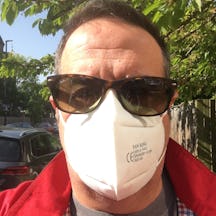
Mark Thomas
Mark Thomas has been a writer and performer for 35 years.
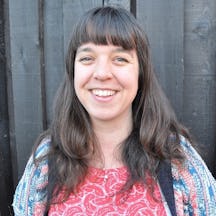
Helen Atkinson
Helen Atkinson is a sound designer working in theatre and live events. Helen has collaborated with Mark Thomas on a number of live shows including ‘Bravo Figaro!’, ‘Cuckooed’ and ‘Mark Thomas’ Check-Up – Our NHS@70’.
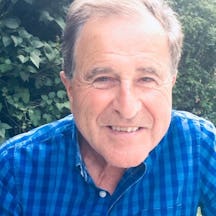
Nicolas Kent
Nicolas Kent was the Director of the Tricycle Theatre in London for 28 years. His political pieces there included: ‘Half the Picture’, ‘The Colour of Justice (The Stephen Lawrence Inquiry)’, ’Nuremberg’, ‘Srebrenica’, ‘Guantanamo’ (nominated for an Olivier award) ‘The Riots’ (2012) and ‘Bloody Sunday’ (Olivier Award for Special Achievement). In 2009, he directed the nine-hour trilogy ‘The Great Game – Afghanistan’ in London, New York and Washington. In 2016 he directed ‘Another World’ at the National Theatre and in 2017 ‘Mark Thomas’ Check-Up – Our NHS@70’. He has also directed productions in the West End, at the RSC, the Royal Court, and on and off-Broadway.
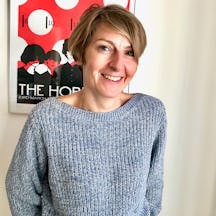
Susan McNicholas
Susan has worked with Mark Thomas for nearly 20 years. She is currently unemployable.
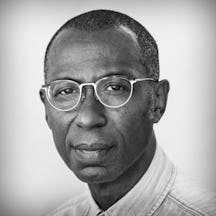
Franklyn Rodgers
Franklyn Rodgers is an artist and creative director whose work explores innovative approaches to re-examining the portrait in contemporary visual culture. His work not only investigates portraiture through narrative, content and context, but also how their placement can open new dialogues in challenging the idea of representation within the language of photography. He has exhibited internationally and his work is held in the permanent collections of the National Portrait Gallery, Tate Britain, Lloyds of London, Welcome Collection, Autograph, Queen Mary University of London and Arts Council England.